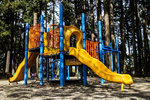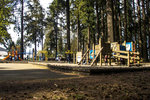


A number of grant applications made to the Washington State Recreation and Conservation Funding Board by local government agencies have cleared the first of three checkpoints on the way to receiving money for public projects.
Those applications include two in South Thurston County — one from the city of Tenino for $297,966 of Local Parks Projects funds toward renovations within Tenino City Park and a $3 million request by the state Department of Fish and Wildlife for a Critical Habitats Projects grant to help the WDFW purchase the Alpacas of America property for a variety of reasons, including Mazama Pocket Gopher habitat mitigation.
The City of Chehalis put in a pair of $500,000 requests to help it complete Phase II of its efforts to renovate and upgrade Recreation Park. Centralia submitted a request for $100,000 to be used for renovating the playground at Borst Park.
All four projects received preliminary approval from the funding board on Oct. 17 and have since been scored and ranked on lists of other applications to each state Recreation and Conservation Office subset, such as the Critical Habitats Projects or Local Parks Projects designation.
“To come to this point, all of those projects were deemed eligible in their different program areas and went through the evaluation process for each category,” said Beth Auerbach, the RCO project manager for Thurston County. “The ones that get ranked have all gone through and can go forward.”
Now the agencies must wait to see if their projects remain on the list that gets approved by Gov. Jay Inslee and sent to the state legislature as part of the capital budget process. Once the legislature approves the capital budget, all the projects contained within it receive funding.
Both the governor and legislature can remove projects from the ranked lists as they work to balance the budget. Neither branch can add projects or change the rankings.
In the most recent capital budget, $80 million was budgeted for RCO grants, down from its initial ask of $120 million. The agency is asking for $130 million in the upcoming budget.
“My understanding is that it’s not uncommon, but not a regular occurrence that something is pulled at that stage,” Auerbach said. “Some could come off (the list) if funding falls through for some reason, if the matching funds they need fall through or if its an acquisition project that can’t be completed. If someone knows constituents might not support it or a project isn’t a priority for the community, a legislator might pull it, but usually something like that doesn’t make it to this point.”
For Chehalis, whether or not it gets its funding could have a critical impact on the future of the Recreation Park project.
As city officials grapple with a tight budget year and the potential for more tough fiscal conversations in the fiscal years to follow, grant funds that would be restricted for use only on the park project would go a long way toward ensuring it gets completed.
“I’m optimistic that if the grants come through, in combination with funding provided by the Chehalis Foundations and money set aside by the Lodging Tax Advisory Committee, it could potentially make the project possible,” Chehalis City Manager Jill Anderson said. “The Chehalis Foundation has an endowment restricted for ballfields and related activities while the LTAC funds are restricted to tourism-enhancing projects. None of it can be used for anything like police and fire expenses or other city budget needs.”